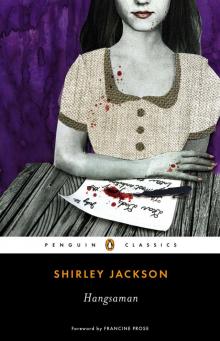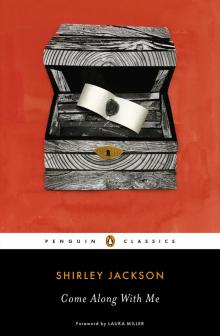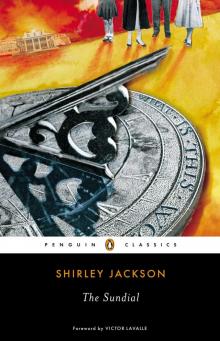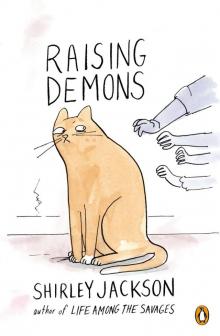- Home
- Shirley Jackson
Raising Demons Page 4
Raising Demons Read online
Page 4
Hesitantly, edging and backing and bowing and countering, they found chairs. I sat briefly until I was positive that our visiting gentlemen were firmly set into position, and then said, “Excuse me,” and raced back into the kitchen, where I took down glasses and set them on a tray, got out ice, spread the doughnuts thinly on a plate, and padded the spaces between them with gingersnaps. Give the coffee another five minutes, I thought, sugar and milk, spoons. When I came back into the living room I found our guests sitting, each with hands folded in lap, and all turned intently to Laurie, who was saying, “And the thing is, when you’re playing second and there’s a man on first, see, you wanna—” Everyone stood up again when I came to the doorway, and I said, “No, no, sit down, please,” and finally sat myself, abruptly, onto the telephone table chair so that Mr. Yashamoto and Mr. Masamitsu and Mr. Fernandez and Mr. Lopez and Mr. Babar would also sit down. Hastily, I noted that Mrs. Fernandez was giving Laurie that gaze of hypnotized attention which usually means a state of utter bewilderment, that my husband was eying Mr. Yashamoto in the manner of a monomaniac who intends shortly to enter upon his exclusive field of interest—in this case, of course, coins—and that Jannie and Sally between them had cornered Mr. Fernandez. Laurie gave every impression of being about to describe, in detail, the several innings of his latest game, and Mr. Babar had a small notebook in which he was writing busily, pausing occasionally to glance curiously at the books on the shelves, or the children’s bare feet, or the rug, or the table lamps, and then returning to his notebook to write again. I thought of telling him that the house was not ours, and that we claimed almost nothing in it, and then reflected that the furniture was of rather better quality than what we had left in the grasp of Mr. Cobb, so I was quiet.
“Trouble with most longball hitters, you got to—” Laurie was continuing purposefully, and I turned to Mr. Lopez, who was on my left, and I smiled at him politely and he smiled back. I strongly suppressed a basic superstition which came unbidden to my mind (if you talk loud enough you can make them understand) and said, very softly, “And how long have you been here, Mr. Lopez?”
He looked surprised, and thought. “Ten minute?” he said at last, tentatively.
“No, no. How long have you been in this country?”
Again he thought. “Juan,” he said hesitantly. “Juan Lopez.”
I smiled largely, and nodded. “And do you like it?” I asked.
“Oh,” he said, pondering. “Very much,” he said finally, and we both smiled, and nodded, and repeated “very much,” and smiled again.
“This is fine country,” Mr. Yashamoto said. “Very eatable food in this country.”
“We especially,” Mr. Masamitsu said suddenly, “we especially enjoy hot dog. And mustard,” he added wistfully. “And spaghetti.”
“Boy,” Laurie said, and sighed. “And relish. And pickles.”
“Peeckle?” Mr. Masamitsu turned wonderingly to Laurie. “Peeckle?”
“Peeckle,” said Sally, enchanted into speech, “peeckle, peeckle, domineeckle.”
“Anyway,” Laurie said, loudly overriding his sister, “I suppose you know what rice is, I guess? I guess you eat a lot of rice at home, don’t you?”
Mr. Masamitsu shuddered delicately. “Indeed no,” he said with eagerness, “indeed I do not; me, I eat no rice. Indigestion,” he said widely, and everyone smiled, and nodded.
Mr. Babar for a minute raised his head from his notebook, regarded Mr. Masamitsu intently, obviously debated making a note, and then reluctantly refrained; instead he leaned toward Sally and touched her hair gingerly and Sally turned, giggled, and said “Hey!”
“You are most kind,” Mr. Yashamoto said suddenly to my husband, “to allow us to come into this country of yours.”
It was at this moment that, as I say, the United States government, flags flying, walked into our living room and sat down. I could see my husband’s eyes widen and knew that without warning the same realization had come to us both; here we were, unprepared, in a sort of ambassadorial role, forced to stand or fall by our reasonably representative way of life; we spoke simultaneously—was that “Yankee Doodle” sounding in the distance?—“Nice of you to come,” my husband said largely, and I said with a great heartiness, “I hope you enjoy it here.” Then everyone smiled and nodded again to each other, and I muttered, “Coffee?” and fled to the kitchen.
Jannie and Sally, with great plans for passing cookies, followed me into the kitchen, and I gave Jannie the sugar and milk to carry, and Sally the plate of doughnuts, and came after them with the tray of iced coffee. Each of our guests solemnly accepted a glass of iced coffee and—I believe most of them thought this a ceremonial to be followed precisely—a spoonful of sugar and a little milk, and then, finally, one doughnut. Food, no matter how ceremonial, had its usual gracious effect, and I felt my position as international hostess relax slightly as, glasses and doughnuts in hand, our guests stirred, and rose, and spoke to one another, and moved around.
Mr. Yashamoto at last entered into an animated conversation with my husband about Japanese coins. Laurie and Mr. Masamitsu discussed with loving detail the several beauties of the hot biscuit, the hamburger, the corn on the cob. Jannie took Mr. Lopez by the hand and led him off to see Ninki’s kittens, Mr. Babar settled down to a painstaking scrutiny of the bookcase, Sally was telling Mr. Fernandez, with dramatic action, the story of the three bears, and I came over to sit beside Mrs. Fernandez on the couch and said, “What a lovely skirt.” It was flaming red, with heavy gold embroidery around the hem, and I would have given my eyeteeth to have one like it. “Lovely,” I said.
“Yes?” she said. “I not espeak English, no.”
I thought deeply. “Lovely,” I said, touching her skirt, and she watched me and then, touching her skirt, said imitatively, “Lovelee?”
Inspiration came to me. “Wait a minute,” I said, holding up one finger in what I believed might be a universal gesture for patience, and I hurried over to where Barry, in his playpen, was thoughtfully chewing on his sunsuit strap. I lifted him, gave him a quick swipe across the bottom to make sure he was dry, and then brought him back and put him into Mrs. Fernandez’ lap. “Baby,” I said triumphantly.
She put her arms around him and hugged him, and Barry, craning his neck back to see her, regarded her for a minute with a slight frown, then apparently decided that she was friendly and smiled. I wondered briefly, watching him, if Barry’s warm smile was not precisely the smile, friendly but bewildered, which we had all been using toward one another as a substitute for communication, and I looked upon my younger son with fond pride.
“Bébé?” said Mrs. Fernandez. She held out her finger and Barry grasped it and they both smiled again; she looked at me and we both nodded and laughed. Barry reached up and took hold of one of her gold earrings and she spoke to him rapidly in Spanish, and Barry smiled, and she and I looked at one another, and laughed. It was a masterpiece of communication.
“Balli?” she said to me.
“Barry.”
“Ah,” she said. “Barri.” She spoke to him again, and he answered her in his language, which was surely as comprehensible to her as mine, and he showed her his four teeth and got her earring in his hand to play with. We were getting along famously; we were all beaming at one another once again when a voice spoke suddenly behind me. “Do you eat?”
Startled, I turned; it was Mr. Babar, squatting beside my chair. “Do you eat—” he thought, pencil in hand “—breffist food?” he finished finally.
Blinking, I said, “Well, of course, we send for space goggles from the cartons, and compasses and things, but I personally—”
“The little Balli—what eats he?”
“Cereal,” I said meekly. “Strained baby food.” Mr. Babar frowned, shaking his head, and Mrs. Fernandez and Barry stared, uncomprehending, from one to the other of us. I sighed and stood up, giving them both my
universal sign for patience, and went into the kitchen and came back with an unopened box of Barry’s cereal and a jar of strained squash. I handed them to Mr. Babar and he scowled at them, making notes in his book. “Most very interesting,” he said, and reluctantly gave them back.
I felt like an idiot, but I said, “Would you like to keep them? I have plenty more.”
“Keep them? Take them with?”
“If you want to.” I gestured foolishly, but Mr. Babar said with pleasure, “Thank you very much; this is of the utmost great value,” and hastily, as though afraid I might after all insist upon taking back my cereal and my strained squash, he hastened to his briefcase and stored them away. Then, coming back to where I was sitting, he asked, pencil poised, “Shampoo?”
I nearly did international relations an irreparable harm by giggling. After a minute, however, I said, sober-faced, “I wash my hair with it. So do my daughters.”
“Ah.” He wrote. Then he touched the sleeve of my blouse with the tip of the pencil. “How much?” he asked.
I stirred uneasily, and glanced around to see if my husband was listening, but he was showing Mr. Yashamoto our Japanese netsuke, a lovely little ivory carving which had been my birthday present. “This,” I heard Mr. Yashamoto say incredulously, “is Japanese?”
“Eleven-ninety-eight,” I said very softly to Mr. Babar, “but if you don’t mind—”
“Eleven dollar?”
“It’s nylon,” I said, “but please don’t tell—”
He beamed. “Ah,” he said. “Nylon.” And he made another note.
Mrs. Fernandez was singing softly to Barry, who lay back against her arm making small quiet noises, and Jannie and Mr. Lopez came back into the room and I heard Mr. Lopez saying, “People from different countries seem different, my Jonni, but cats—never. Cats are always much alike.”
“Except,” said Jannie intelligently, “that some of them are black and some of them are white and some of them are gray and some of them are striped.”
“True, true,” said Mr. Lopez, and Mr. Babar, apologetically, touched me on the arm to attract my attention. “Television?” he asked anxiously.
Suddenly, in the middle of a sentence, Mr. Yashamoto glanced at his watch and rose. “One hour,” he announced, and our guests stood, all together. Mr. Yashamoto came across the room and bowed quickly to me. “Thank you very much for visit to your home,” he said. “You have been most instructive.”
I leaned down to take Barry from Mrs. Fernandez and she hugged him and handed him to me. Between the two of us we managed to pry her earring out of his hand. “An opportunity not to miss,” Mr. Babar said to me, and then, unexpectedly, “I will not reveal cost of clothing.” I could have sworn he winked at me.
Mr. Lopez shook hands with Jannie, and Mr. Fernandez removed Sally from his lap. “How about a game tomorrow?” Laurie said to Mr. Masamitsu, and Mr. Masamitsu bowed. “Swell,” he said precisely, “idea.”
“I do hope you’ll come again,” I said generally. “We have enjoyed your visit so much.” I turned to Mrs. Fernandez and said, “It has been a real pleasure.” “Bébé,” she said, touching Barry’s head. “Barri.”
“Come any time,” my husband said roundly to Mr. Yashamoto, “show you some more of those Japanese coins.”
They were all moving gradually toward the front door, and then, when they reached it, passed through it in single file, as they had entered, and lined up again on the front lawn.
“Thank you once more very much,” Mr. Yashamoto said, and my husband and I both said, “Do come again,” and Laurie called out, “Be seeing you, fellas,” and Jannie and Sally called, “ ’Bye, ’bye, ’bye.”
They wandered off down the country road, our guests, conversing among themselves, and pausing once for a minute while Mr. Babar turned and took a long look at the outside of our house. Then he wrote quickly in his notebook, and they went slowly on.
• • •
August came upon us soon thereafter, and Laurie began saying “school” in a dreary voice, and giving us monologues which usually began, “Why’d they ever invent school, anyway, if they’d only—” My husband and I asked one another what had become of the summer, and at the dinner table we wondered constantly that the weeks had seemed so short. Laurie reported that Mr. Yashamoto had turned into a pretty fair shortstop, and then, sadly, that they had all gone. Mr. Yashamoto had promised to write to Laurie, and had left behind a snapshot, taken by Mr. Masamitsu, of himself and Laurie standing together grinning, with the lake behind them and a baseball bat in front of them, and Laurie put the picture up on his bedroom wall. Mrs. Simpkins stopped over one morning to say that her boy had settled down to studying his arithmetic against the approach of school, and they had seen so little of Laurie they wondered if he was studying, too. I said that Laurie had been teaching his sister Sally to dog-paddle.
With the departure of Mr. Yashamoto and Mr. Masamitsu the baseball season suffered a perceptible slump, and Laurie had been moping, sad and listless, his occupation gone, until he fortunately recollected the existence of the riding stables. As a matter of fact, it had seemed to me at first that Mrs. Simpkins’s inquiry after Laurie was ironic, since I thought it unlikely that anyone living only next door could be in any doubt about Laurie’s current interest. The first sign of Laurie’s presence was always the panting arrival of our big dog Toby, then came the crash of Laurie’s bike hitting the ground, and then, vividly, sometimes from as far away as ten or fifteen feet, the inescapable air of horse.
From a stable sage named Jerry, Laurie had managed to pick up such valuable items of information as the probable hands high of horses, what a cinch is, and certain aphoristic opinions which seemed to me more suitable for a men’s smoker than a family living room. His father, whose interest in horses was confined to their shoes, was required, as the only other man around the house, to listen to unending detail about a black and white bay—or it may have been a bay and white black, or black and bay, or even spotty, as Sally suggested—whose name was Popeye and who was supposed by the bloods around the stable to be exceedingly dangerous. Sally and Jannie and I believed implicitly that Popeye had eaten a former stableboy and perhaps even another horse, and it became a custom with me to glance quickly at Laurie when he came home to see if there were any marks of horse’s teeth on him.
We planned to leave our borrowed house earlier than most of our neighbors were planning to leave their summer houses, because we thought to give ourselves two good weeks to get moved before school. As a result, the last days of our summer vacation were filled with farewell parties. We had been out playing bridge on Saturday night and because it was our last Saturday night had been persuaded to stay for one rubber over our quota (and would have won it, too, if my husband had led back a spade that time); when we got home we were both a little irritable (and so was the baby-sitter, coming sleepily out to the car with her coat thrown over her shoulders) and entirely because of my husband’s forgetfulness I neglected to set the alarm. As a result I woke up on our last Sunday morning with one of those guilty starts, and found myself staring unbelievingly at an alarm clock which had slid secretly past eight o’clock and somehow gotten itself around to half-past ten.
Now, I do not believe that my children will pack up their little clothes and their small treasures in colored bandanas and set off, trudging sadly down the road out into the cold world—I do not really believe that my children will run away from home if Mommy is not up in time to give them breakfast, but this morning the house was suspiciously quiet, and when I cried out “Laurie?” and then “Jannie? Sally?” there was not even an echo to answer me. My husband stirred uneasily and I snarled at him, rolling out of bed and racing into the girls’ room, saying “Jannie? Sally?” in a voice which became more urgent as I perceived that they were not there, but that they had most certainly been there for some space of time after arising; the toys were out of the book
case and a fort of some kind had been built with dresser drawers in one corner of the room; Jannie’s box of very small glass beads had been broken open and the beads scattered around thoughtfully near to the door so that, barefoot, I managed to step on several thousand.
As a last heartbreaking touch—a tender gesture for Mommy, no doubt, and probably performed just before the final exit into the world—both beds had been made, crookedly and with the sheets hanging, but still made, with the spreads put on. In Laurie’s room, The Boy’s Book of Baseball Stories lay open on the bed, and Barry, who after nearly nine vivid months of life had developed a kind of patient cynicism about his family, was lying in his crib talking to himself and playing agreeably with Laurie’s hairbrush. I absent-mindedly picked up Laurie’s pajamas, which were sprawled on the floor, and looked into them vaguely, saying “Laurie?” Since his dirty socks and dirty shirt and bathing trunks and riding boots were on the floor I could see no reason for hanging up his pajamas, and dropped them back onto the floor and said to Barry, “Where is Brother?” He stared at me, and then smiled.
Followed by Barry’s sudden wail, I went padding from step to step downstairs and into the kitchen, where I was suddenly made aware of my optimistic conclusion the night before that I would leave the dinner dishes and do them in the morning. “Laurie?” I said. “Jannie? Sally?” There were three cereal bowls on the table, two empty and one half empty, and, glancing at the cereal boxes where they sat high on the shelf, I reflected briefly on the magical capacities of children who are hungry and relieved of the pressing assistance of adults. I decided that I could not go out hunting for my children until I had clothes on, and went back upstairs to dress. I had brushed my teeth and combed my hair and was looking for a clean handkerchief when I heard the clear sweet voice of my long-lost daughter Sally. “Mommy?” she was saying in the kitchen, “Mommy has gone to Fornicalia to live. Where my grandma lives, grandma. Would you please like some breakfast?”

 The Road Through the Wall
The Road Through the Wall Hangsaman
Hangsaman Come Along With Me
Come Along With Me The Lottery
The Lottery Just an Ordinary Day: Stories
Just an Ordinary Day: Stories The Sundial
The Sundial Dark Tales
Dark Tales Let Me Tell You: New Stories, Essays, and Other Writings
Let Me Tell You: New Stories, Essays, and Other Writings The Haunting of Hill House
The Haunting of Hill House The Bird's Nest
The Bird's Nest Raising Demons
Raising Demons We Have Always Lived in the Castle
We Have Always Lived in the Castle The Letters of Shirley Jackson
The Letters of Shirley Jackson The Missing Girl
The Missing Girl Let Me Tell You
Let Me Tell You